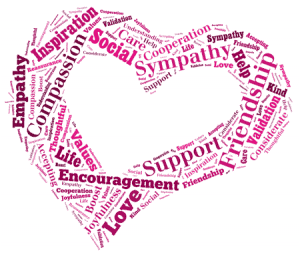Recently I received the following note from a reader:
So the story about the woman who was in the marriage for 13 years and she hated her husband and realized she was secretly into rejection…Yeah, I get that. But I turned the corner, went to therapy, etc…. and now find myself in a HEALTHY RELATIONSHIP for the first time EVER with a HEALTHY fella and I hate it. LOL.
I really want to figure out how to transfer all the gooey love feelings associated with the dysfunctional relationships I’ve been in… I want to transfer those feelings to this healthy one. Cause boy, I’d love to work this out…
Here is my reply, with my best advice broken down into four steps.
Dear Reader,
Congratulations for leaving behind your history of unhealthy relationships. This is a monumental accomplishment. Did you know that the vast majority of people never get out?
I don’t know anything about you or your relationships. Yet, for example, did you know that 85% of women who leave abusive relationships actually return to those relationships? This is according to the National Coalition Against Domestic Violence.
✅ You might also like: Turning Your Frog Back into a Prince (or princess).
The reasons for returning are compelling and complex. Emotional, physical and financial dependency often dictate the decision.
At any rate, leaving a bad relationship of any kind is a heroic feat, in my opinion. If you’ve let go of a pattern of bad relationships, I hope you’re extremely pleased with yourself.
Better yet, you’ve found a healthy man. Awesome. I know you probably weren’t expecting to hate being in a healthy relationship. Who would expect that?
Again, it’s common. Don’t think that you are going through something that is unique to you, or a reflection of your potential. This just means that you are normal.
To help you through the transition, I’d like to offer the following four suggestions.
I’ll assume that your current relationship is indeed healthy, in your best interest, capable of being loving, and safe. Here we go!
1. Give yourself permission to take your time adjusting.
It takes time to adjust, but that time doesn’t begin until you officially give yourself permission to actually take it.
Think of it this way:
What if you moved from the heart of New York City (8,400,000 people) to Summerset, South Dakota (1818 people)?
What would happen if you suddenly were promoted from department manager to executive vice president in charge of 12 departments?
Actually, I once transitioned from private practice mental health counselor to operations manager of a large engineering firm. Nightmare.
The point is – it takes time and the clock may not start ticking productively until you officially acknowledge that you are in transition and give yourself that space. Otherwise, the stress of your own unrealistic expectations will plague you.
When I transitioned from counselor to middle manager, I didn’t allow for the fact that all the communication dynamics would be different. I was under constant, self-imposed stress because I never admitted not knowing the rules of the game in the new context. I could have learned much faster if I had.
So – make it official. You are in transition. Adjust your expectations accordingly. I’d give yourself 1-2 years to adjust. It takes time. Have you consciously acknowledged this?
This is why suggestion number two is so important.
2. Include your partner in your process.
If your partner is a healthy man, he will support you in the transition. He’ll understand. He won’t hold it against you. Share exactly what is going on for you and openly acknowledge the challenges when they are happening. This can work miracles. It gives you a chance to work on things together and in real time.
Hope and I practice this one a lot. When we got together, we were both used to being the one in charge. So, we had power struggles. She said to me one day, “I am having a hard time letting you be in charge right now.”
We worked on the issue right then and there. Ultimately, we came up with a lasting solution, that works for us now. She’s in charge of certain things. I’m in charge of certain things.
The key was pointing out the power struggles as they were happening and not just fighting it out until our mutual respect was destroyed.
So, share the fact that you are in transition with your partner. Speak up and name the issue when you experience it. Include him in your quest for solutions.
3. Adopt a new definition of love.
There is a powerful emotional reason why people stay in unhealthy relationships, even when they hurt. The same powerful reason keeps you from enjoying a new, healthy relationship.
The reason is this: The chronic control, rejection and deprivation of needs – experienced over a long period of time in bad relationships – becomes so familiar that it feels “right.”
In fact, over a period of time, these negative states almost act as needs, as if we have redefined love to match how we’ve been treated.
Moreover, healthy love is foreign and therefore feels strangely “wrong” or even untrustworthy. This isn’t the “love” that you have known.
Human beings love familiarity. Familiarity feels safe and tolerable. On the other hand, foreign things don’t seem so safe. I often say that people (myself included) would choose a familiar misery over a foreign happiness every time.
Beyond familiarity, we can get positively addicted to the emotional drama of an unhealthy relationship. We hate all that, but do we? There can be a fine line between love and hate, can there not?
We get subconscious pleasure and self-justification from twisted relationships. We secretly love to engage in battle, prove the other wrong, complain about the burden of it all and wallow in delicious misery.
For example:
You’re in a tumultuous relationship – fights and more fights. Things calm down for a day or two, so what do you do? Pick a fight….
You’ve been dating jerks and suffering their jerk-dom for a while. So, you begin choosing men who are capable of a healthy relationship. But those guys are so boring!
You’ve been in controlling relationships where someone wants to dictate your every move. When you find yourself in a healthy relationship with clear boundaries, you feel indecisive, lost and alone.
You’ve been in relationships with people who cheat. When you find a loyal partner, you can’t help but anticipate his cheating, and even accuse him of it over and over. You’d almost feel relieved if he did cheat. At least it would end the anticipation of betrayal.
Make a list of the angst you typically expected from partners in the past. Things like: control, rejection, being ignored, disloyalty, laziness, anger, etc…
Bear in mind that part of you still expects these things – or even wants them in a strange, subtle way. You’ve learned that these things – and what goes along with them – are love.
So, when your healthy guy comes home and says, “Hi honey, I missed you today. What shall we do this evening?” It seems so “off.” No emotional extremes. Just one person wanting to enjoy another.
When this happens, acknowledge to yourself that you have a different definition of love that involves negative attention, not positive. Take a deep breath. Don’t worry if you aren’t ready to embrace the positive attention yet. Just be honest about what is going on for you.
For example, you can say to yourself the following:
John just came in and said how much he missed me today and that he wants to spend the evening with me. This is healthy, but I don’t like it. I am used to someone coming in and greeting me in a negative way. In fact, I view that kind of attention as love. No wonder I have a hard time appreciating John right now.
That’s it. If you are going to redefine yourself emotionally, you need to be brutally honest with yourself. In time, your honesty will begin to raise questions like:
How long must I believe that negative attention is love?
How can I learn to accept John’s more mature love?And then:
I’ve had just about enough of my old definition of love! I am ready to enjoy a healthy relationship, at last.
Then, you’re very likely to close the door on your past and let it be.
Best of all, at some point, your old definition of love will begin to cause you pain. This is grief – and it’s a very positive sign.
Grieving your past relationships is a significant step forward. It leads to healing, which opens you to better possibilities.
Then, you get to create your new definition of love in a healthy relationship. What should healthy love be like for you? Write it down. It’s something to move toward.
4. Finally, accept the higher expectations that are typical in a healthy relationship.
Here’s the thing about relationships with two mature, healthy partners. Both partners usually hold very high expectations of each other.
In unhealthy relationships, we bemoan our partner’s faults – the negativity, laziness, anger, irresponsible behavior, etc…but don’t really expect anything more. In fact, we often completely indulge our unhealthy partners in all kinds of shenanigans.
Not so in healthier relationships. We set the bar higher in mature relationships. For example, as a husband, I don’t have the luxury of indulging my childishness for very long.
Emotional negativity, slacking around the house, avoiding work responsibilities, rude communication…Hope and I don’t tolerate much of these from each other. Every healthy relationship I know of is similar.
And I love it. I want to be with someone who refuses to tolerate my childishness. I want to hold high expectations of my partner. These expectations make or break a relationship.
Are you ready for higher expectations? To expect more from him and have more expected of you? It’s a worthwhile question.
In summary:
1. Officially give yourself time to fully adjust: 1-2 years.
2. Include your partner in your transition process.
3. Define love differently.
4. Embrace higher expectations in your relationship.
I hope this helps.
Resources:
Many people have benefited by realizing their relationship choices reflect self-sabotaging tendencies. With self-sabotage, negativity seems attractive. The AHA Solution video takes a deep look at how self-sabotage works and how to end it.
Further reading on the web:
Check out this article by Alice Boyes at Psychology Today. The article is called 50 Characteristics of Healthy Relationships. It’s a list of signs that you are in a healthy relationship.
Read the Purpose Fairy’s post: Six Things You Should Forgive Yourself For. Self-forgiveness is an important part of the transition to a healthy relationship – and this is a great post to turn your mind in that direction.
If you enjoyed this article, then like my Facebook Page to keep up with all my writing.







